If you have a feline friend and enjoy having poppies around, it’s crucial to be aware of the potential risks. Poppies are toxic to cats and can pose a serious danger if ingested. In this blog post, we’ll explore the toxicity of poppies to cats, how to identify common types of poppies, symptoms of poppy ingestion in cats, immediate steps to take if your cat ingests poppies, treatment options for poppy poisoning, and preventive measures to keep your cat safe. Stay informed to ensure the well-being of your beloved pet.
The Toxicity of Poppies to Cats
Poppies, known for their vibrant colors and delicate petals, can pose a significant threat to our feline companions. It’s essential for cat owners to understand the potential danger that poppies pose and be aware of the symptoms of poppy ingestion in cats. Here’s what you need to know about poppies being toxic to cats:
Toxic Components: Poppies contain alkaloids such as morphine and codeine, which can be highly toxic to cats when ingested. These substances can induce various adverse effects on a cat’s body, ranging from mild symptoms to severe poisoning.
Symptoms: If a cat ingests poppies, they may exhibit symptoms such as vomiting, diarrhea, lethargy, loss of appetite, dilated pupils, and in severe cases, difficulty breathing or even collapse.
Potential Dangers: Poppies can pose a significant risk to a cat’s health, and if left untreated, poppy poisoning can be life-threatening. It’s crucial to recognize the signs of ingestion and seek immediate veterinary attention.
Comparative Toxicity: When compared to other common household plants toxic to cats, such as lilies or philodendrons, poppies can be equally or even more harmful due to the presence of potent alkaloids.
It’s important for cat owners to be cautious and take preventive measures to ensure that their beloved pets are not exposed to the dangers of poppies. By understanding the toxicity of poppies to cats, pet owners can create a safe environment for their feline companions and minimize the risk of accidental ingestion.
Identifying Common Types of Poppies
When it comes to identifying the common types of poppies, it’s essential to be aware of the various species that pose a threat to your feline friend. Poppies toxic to cats are typically from the Papaveraceae family, and it’s crucial to recognize these potentially harmful varieties:
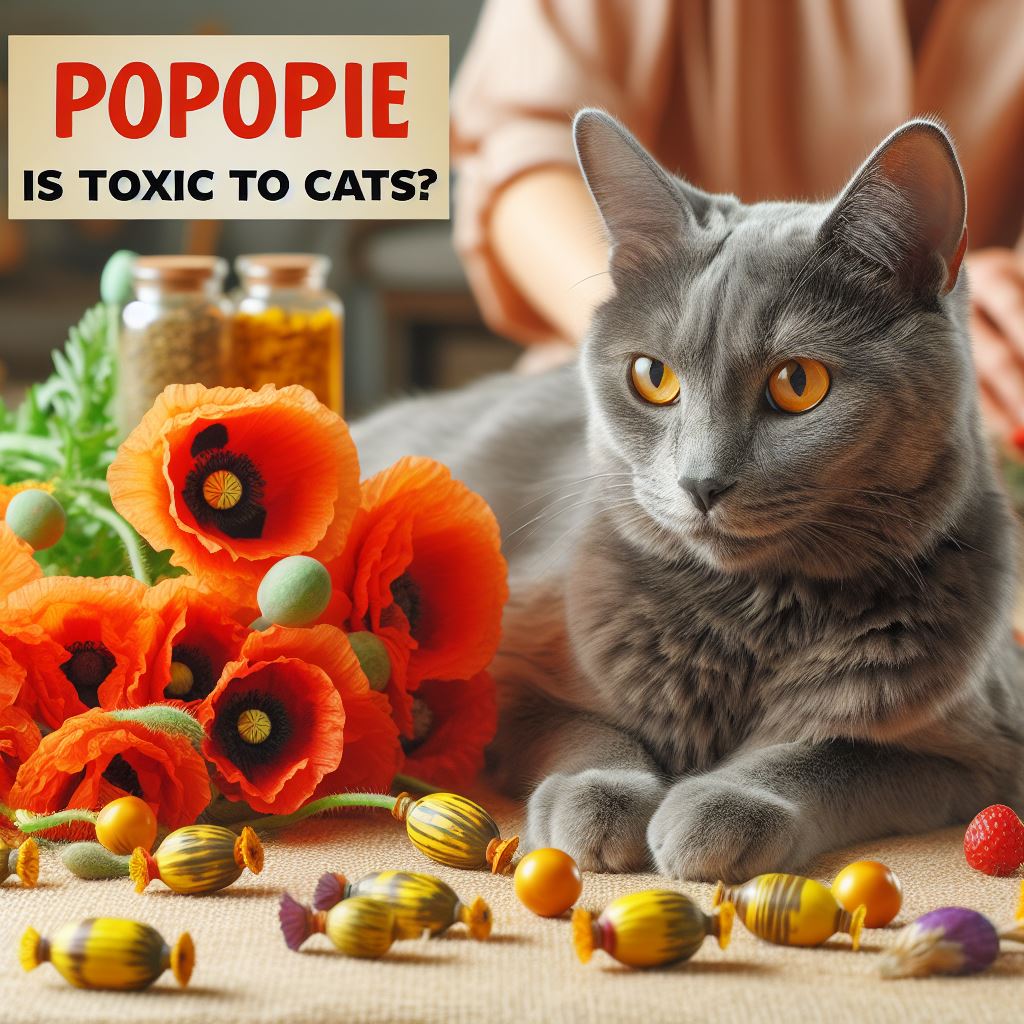
Papaver somniferum (Opium poppy): This type of poppy is well-known for its cultivation in producing opium and other derivatives. Its seeds are often used in culinary applications, while the plant contains alkaloids that can be toxic to cats if ingested.
Papaver rhoeas (Corn poppy): Also referred to as the Flanders poppy, this bright red wildflower contains alkaloids that can be harmful to cats if consumed in large quantities.
Papaver nudicaule (Iceland poppy): While admired for its delicate and colorful flowers, this poppy species also contains toxic alkaloids that can pose a danger to your feline companion if ingested.
It’s important to remember that these poppy varieties, when present in your home or surrounding environment, can put your cat at risk of toxicity. Therefore, being able to recognize these common types of poppies is crucial in safeguarding your pet’s well-being.
Symptoms of Poppy Ingestion in Cats
If your curious feline has come into contact with poppies and you suspect ingestion, it’s crucial to be aware of the potential symptoms of poppy toxicity in cats. Keep an eye out for the following signs:
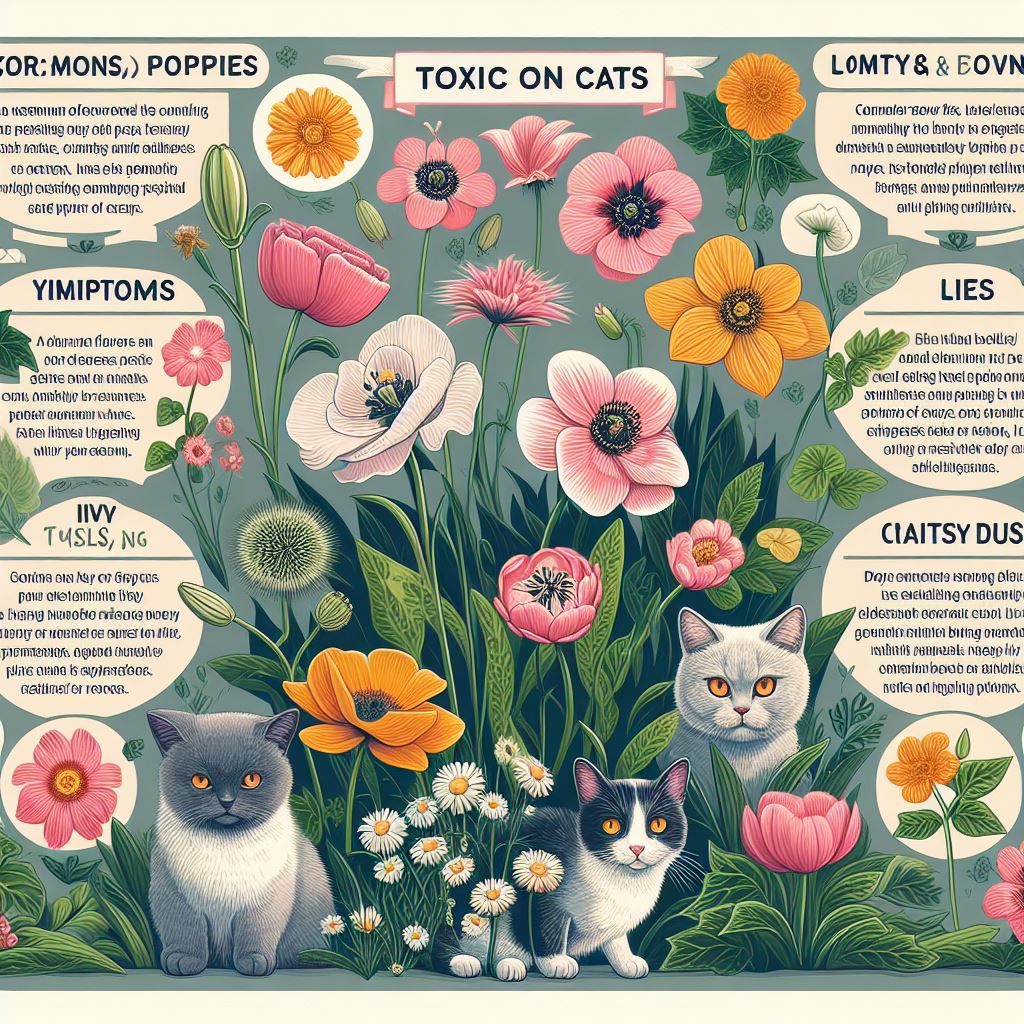
- Gastrointestinal Distress: Poppies toxic to cats can lead to symptoms such as vomiting, diarrhea, and drooling.
- Lethargy and Weakness: Your cat may appear abnormally tired or weak, showing a lack of interest in usual activities.
- Loss of Appetite: Monitor your cat’s eating habits. A sudden disinterest in food could indicate a problem.
- Dilated Pupils: Check for enlarged pupils in your cat’s eyes, which could be a sign of poppy ingestion.
- Agitation or Restlessness: Your cat might display unusual restlessness or agitation, possibly indicating discomfort.
- Seizures: In severe cases of poppy poisoning, cats may experience seizures, which necessitate immediate veterinary care.
It’s important to note that the severity of these symptoms can vary depending on the amount of poppy ingested and the individual cat’s sensitivity.
In case you notice any of these symptoms, do not hesitate to contact your veterinarian immediately. Quick action is crucial to ensure the well-being of your beloved pet.
Potential Dangers of Poppy Exposure
When it comes to poppies and cats, the potential dangers of poppy exposure cannot be overlooked. Poppies are known to contain alkaloids and other compounds that can be harmful to felines. If your cat ingests any part of the poppy plant, it can lead to various health issues, including:
Gastrointestinal Upset: Poppies toxic to cats can cause symptoms like vomiting, diarrhea, and loss of appetite.
Central Nervous System Effects: Ingestion of poppies may lead to symptoms such as disorientation, lethargy, and incoordination.
Respiratory Distress: Poppies can also potentially cause breathing difficulties in cats.
Cardiac Issues: In severe cases, poppy exposure can even lead to cardiac abnormalities in cats.
It’s important to note that the severity of the symptoms can vary based on the amount of poppy ingested and the individual cat’s sensitivity. Additionally, certain types of poppies may pose greater risks than others. Therefore, it is crucial for cat owners to be aware of these potential dangers and take necessary precautions to prevent poppy exposure in their feline companions.
In comparison, some plants are safer alternatives and can be incorporated into your home environment without posing a risk to your cat. It’s essential to be mindful of the potential dangers and make informed choices to safeguard your cat’s well-being.
Immediate Steps to Take if Your Cat Ingests Poppies
If you suspect that your cat has ingested poppies and is showing symptoms of poppy poisoning, it’s crucial to act quickly to ensure the safety and well-being of your feline friend. Here are the immediate steps to take if your cat ingests poppies:
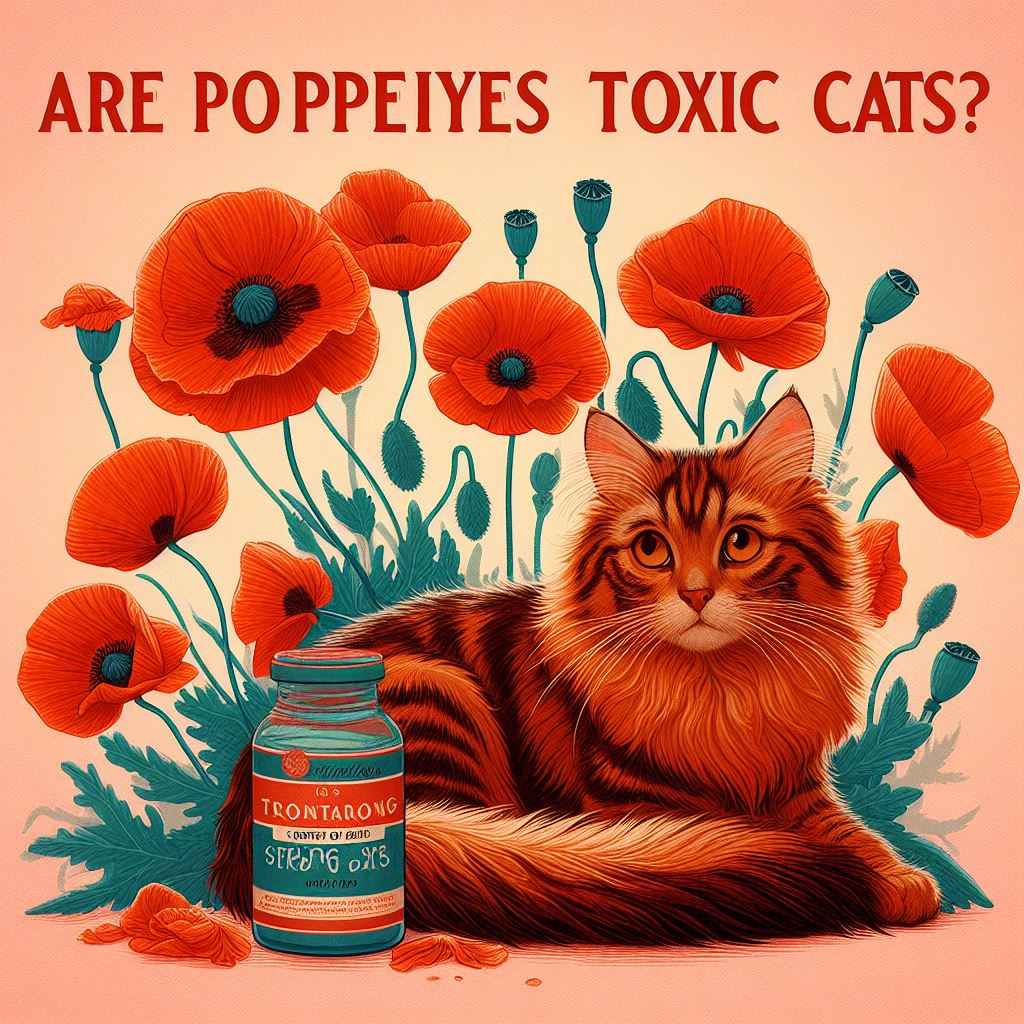
Remove Access to Poppies: If you notice your cat consuming poppies or suspect poppy ingestion, remove any remaining poppies from their vicinity to prevent further exposure.
Contact a Veterinarian: Immediately contact your veterinarian or the nearest animal poison control center. Provide as much detail as possible about the type of poppy, the amount ingested, and the onset of symptoms.
Observe and Monitor: Keep a close eye on your cat and monitor their behavior and symptoms. Look out for signs such as vomiting, diarrhea, lethargy, or unusual behavior.
Avoid Home Remedies: Refrain from administering any home remedies or treatments without professional veterinary guidance. Some remedies may worsen the situation or interact negatively with subsequent medical treatments.
Transport Safely: If advised by the veterinarian, carefully transport your cat to the veterinary clinic. Safely secure your cat for travel and follow any instructions provided by the veterinary team.
Taking immediate action in response to poppy ingestion can significantly impact the outcome for your cat. Remember, swift and informed action is vital in ensuring the best possible care for your feline companion.
Treatment Options for Poppy Poisoning in Cats
If you suspect that your cat has ingested poppies and is showing symptoms of poisoning, it is crucial to seek immediate veterinary attention. Treatment options for poppy poisoning in cats may include:
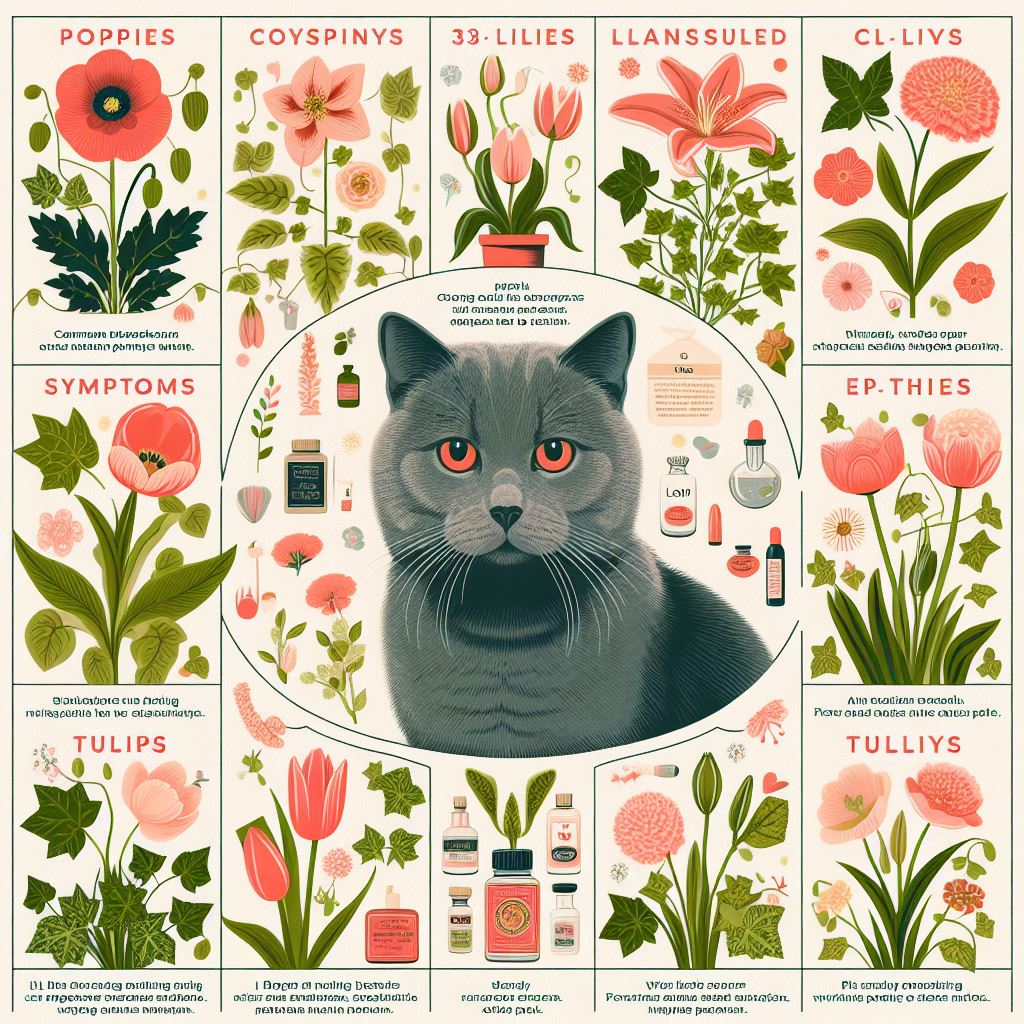
Inducing vomiting: The veterinarian may induce vomiting to remove the remaining poppy plant material from the cat’s system. This is often done if ingestion has occurred recently.
Activated charcoal administration: Activated charcoal may be given to your cat to absorb any remaining toxins in the stomach and prevent further absorption into the bloodstream.
Supportive care: This may involve intravenous fluids to maintain hydration, as well as medications to address symptoms such as nausea, vomiting, or seizures.
Monitoring and observation: Your cat may need to be closely monitored at the veterinary clinic to ensure that their condition stabilizes and improves.
It’s important to remember that home remedies or delaying professional treatment can exacerbate the situation. Prompt veterinary care is essential in cases of poppy poisoning in cats to increase the likelihood of a successful outcome.
Understanding the treatment options and acting quickly can significantly improve your cat’s prognosis and minimize the potential risks associated with poppy toxicity.
Remember, it’s always best to consult with a qualified veterinarian for personalized advice and care tailored to your cat’s specific needs.
Preventive Measures to Keep Your Cat Safe
When it comes to protecting your feline friend from the dangers of poppies toxic to cats, there are several preventive measures you can take to ensure their safety. Here are some important steps to consider:
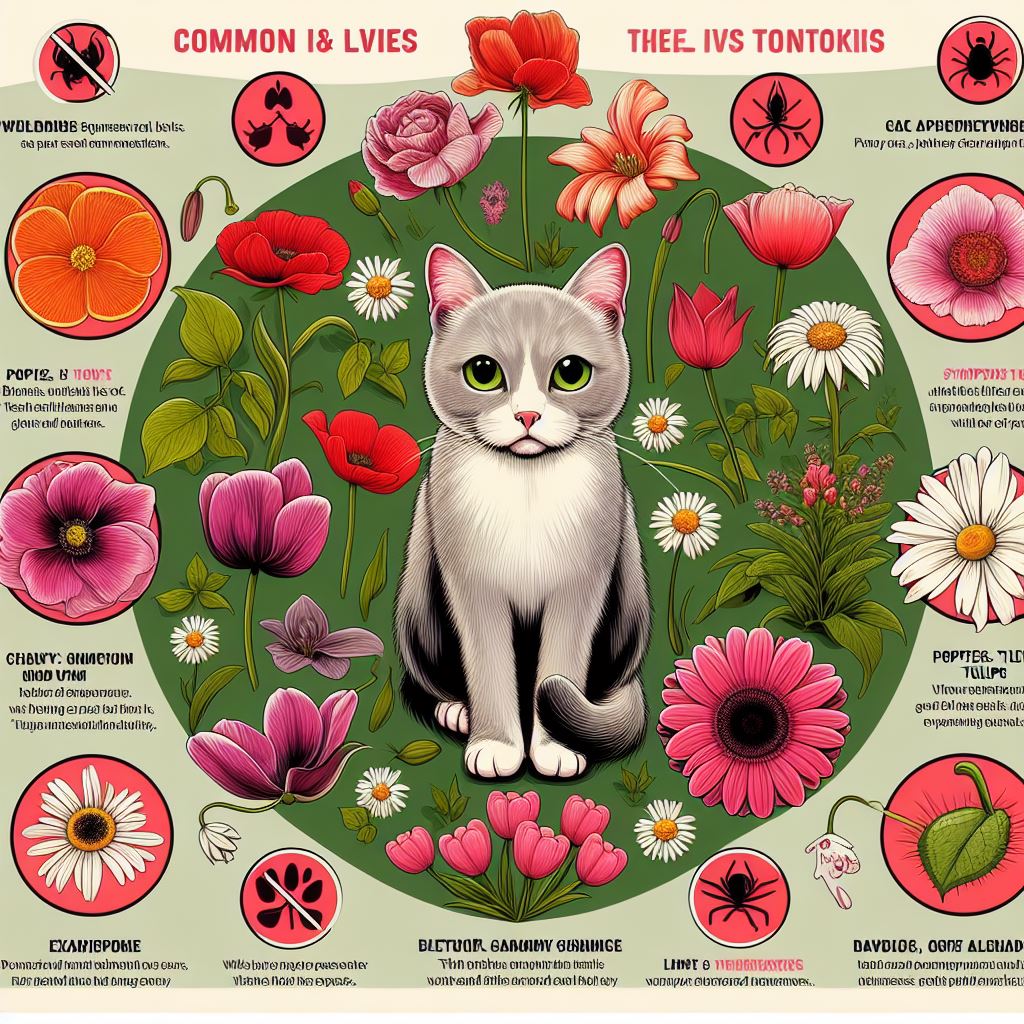
Education: Educate yourself and your family members about the potential risks of poppies to cats. Awareness is the first step in preventing accidental exposure.
Keep Poppies Out of Reach: Whether they are indoor or outdoor plants, make sure to keep poppies in areas that are inaccessible to your cat. This may involve placing them in high-up places or in secured rooms where your cat does not have access.
Invest in Safe Alternatives: Consider replacing poppies with cat-friendly plants. There are plenty of beautiful and non-toxic options such as African violets, Boston ferns, and spider plants that can add greenery to your home without posing a threat to your cat’s health.
Supervise Outdoor Activities: If your cat spends time outdoors, be mindful of the surrounding environment. Ensure that there are no poppy plants growing in your yard or neighboring areas where your cat may roam.
Regular Veterinary Check-ups: Schedule regular check-ups with your veterinarian to monitor your cat’s health and catch any signs of potential poisoning early on.
By implementing these preventive measures, you can significantly reduce the risk of accidental poppy poisoning in your beloved cat. Always remember that proactive measures are key to creating a safe and cat-friendly living environment.
Alternatives to Poppies in Your Home
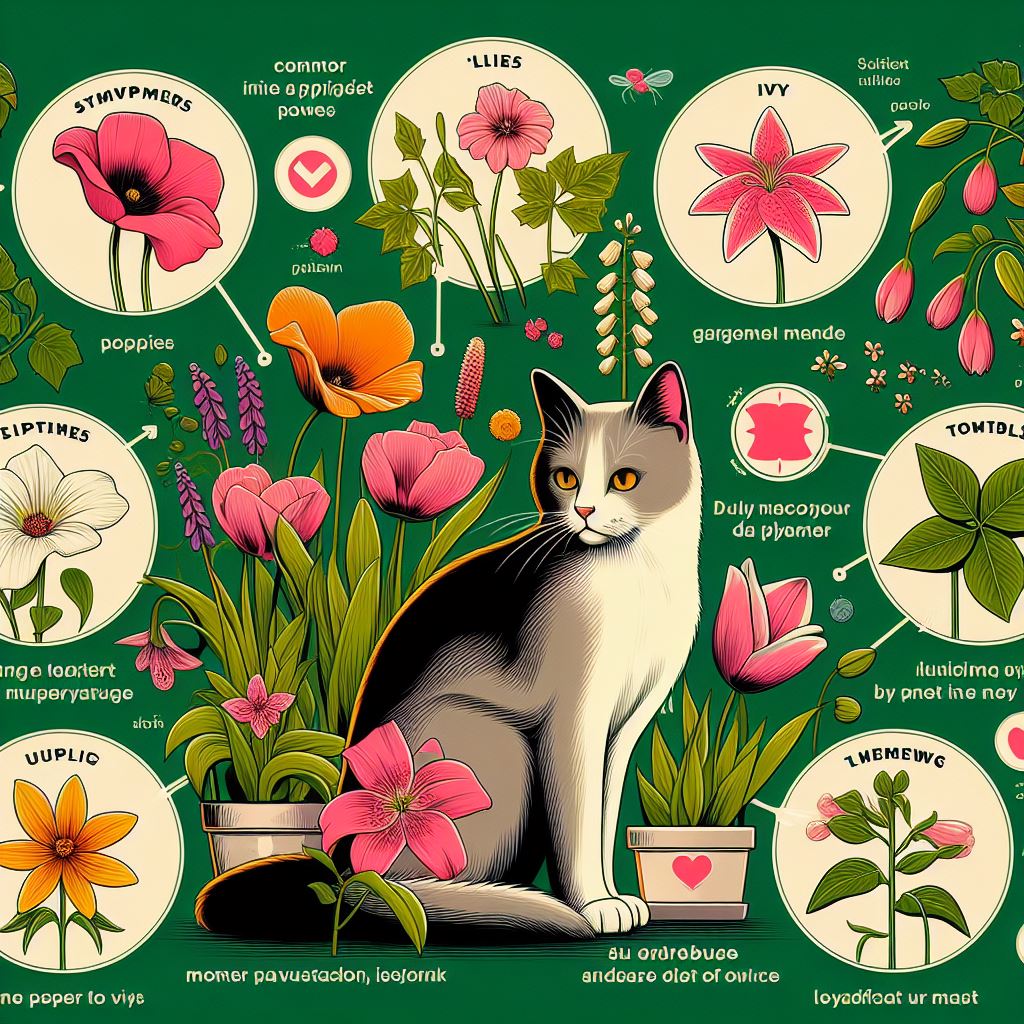
When considering the safety of your feline friend, it’s important to be aware of potential dangers, such as poppies toxic to cats. However, you don’t have to forgo beautiful blooms in your home. There are plenty of alternative flowers and plants that are safe for your cat to be around.
Safe Flower Alternatives for Cat-Friendly Homes
- Roses: These classic blooms are non-toxic to cats and can bring color and fragrance to your home.
- Snapdragons: These vibrant flowers are a safe choice and can add a cheerful touch to your indoor or outdoor space.
- African Violets: Known for their easy care and colorful blooms, these plants are safe for cats and come in a variety of hues.
- Orchids: Elegant and graceful, orchids are non-toxic to cats and can be a stunning addition to your home.
- Sunflowers: Bright and sunny, these flowers are a safe option and can liven up any room.
Cat-Safe Plant Alternatives for Indoor Gardens
- Spider Plant: This easy-to-care-for plant is safe for cats and can help purify the air in your home.
- Boston Fern: With its lush foliage, this plant is a great non-toxic option that can thrive in indoor spaces.
- Bamboo Palm: Known for its resilience, this plant is safe for cats and can bring a tropical feel to your home.
- Parlor Palm: This small, low-maintenance palm is a safe choice and can add a touch of greenery to any room.
By opting for these cat-friendly alternatives, you can create a beautiful and safe environment for both you and your beloved pet, while still enjoying the natural beauty of flowers and plants in your home.
Consulting a Veterinarian for Further Advice
If you suspect that your cat has ingested poppies or is exhibiting any concerning symptoms related to poppy toxicity, it’s crucial to seek professional help from a veterinarian. Consulting a veterinarian for further advice is the best course of action to ensure the health and well-being of your feline companion. Here are some important points to consider when seeking veterinary assistance:
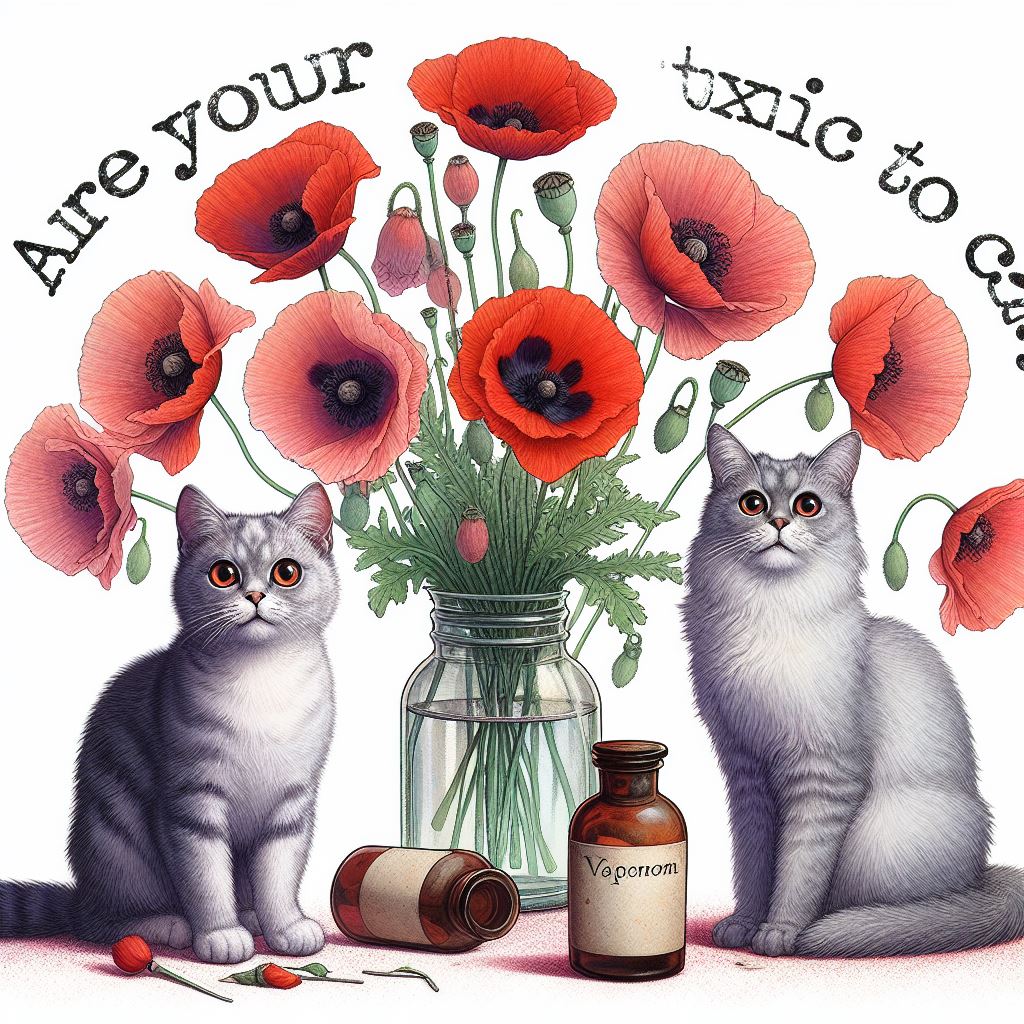
Urgent Medical Attention: Immediate consultation with a veterinarian is essential if you suspect poppy ingestion or observe symptoms of poisoning in your cat. Prompt action can be critical in managing poppy toxicity in cats.
Symptom Description: When you consult a veterinarian, provide a detailed description of the symptoms your cat is experiencing. Mention any behavioral changes, physical abnormalities, or signs of distress that you have noticed.
Medical History: Inform the veterinarian about your cat’s medical history, including any pre-existing conditions, ongoing medications, and past incidences of exposure to potentially toxic substances.
Diagnostic Tests: The veterinarian may conduct various diagnostic tests to assess the extent of poppy poisoning and its impact on your cat’s health. These tests may include blood work, urinalysis, and other relevant assessments.
Treatment Recommendations: After evaluating your cat’s condition, the veterinarian will recommend appropriate treatment options, which may include supportive care, medication, or other interventions tailored to your cat’s specific needs.
Follow-Up Care: The veterinarian may provide instructions for at-home care and schedule follow-up appointments to monitor your cat’s progress and recovery.
Remember, your veterinarian is the most qualified resource to provide tailored guidance and medical treatment for poppy toxicity in cats. Seeking professional advice is indispensable for ensuring the best possible outcomes for your beloved pet.
Raising Awareness: Educating Others about Poppy Toxicity for Cats
It’s crucial to spread awareness about the dangers of poppies to cats in order to protect our feline companions from potential harm. Educating others about poppy toxicity for cats can help prevent accidental ingestion and poisoning. Here are some key points to consider when raising awareness:
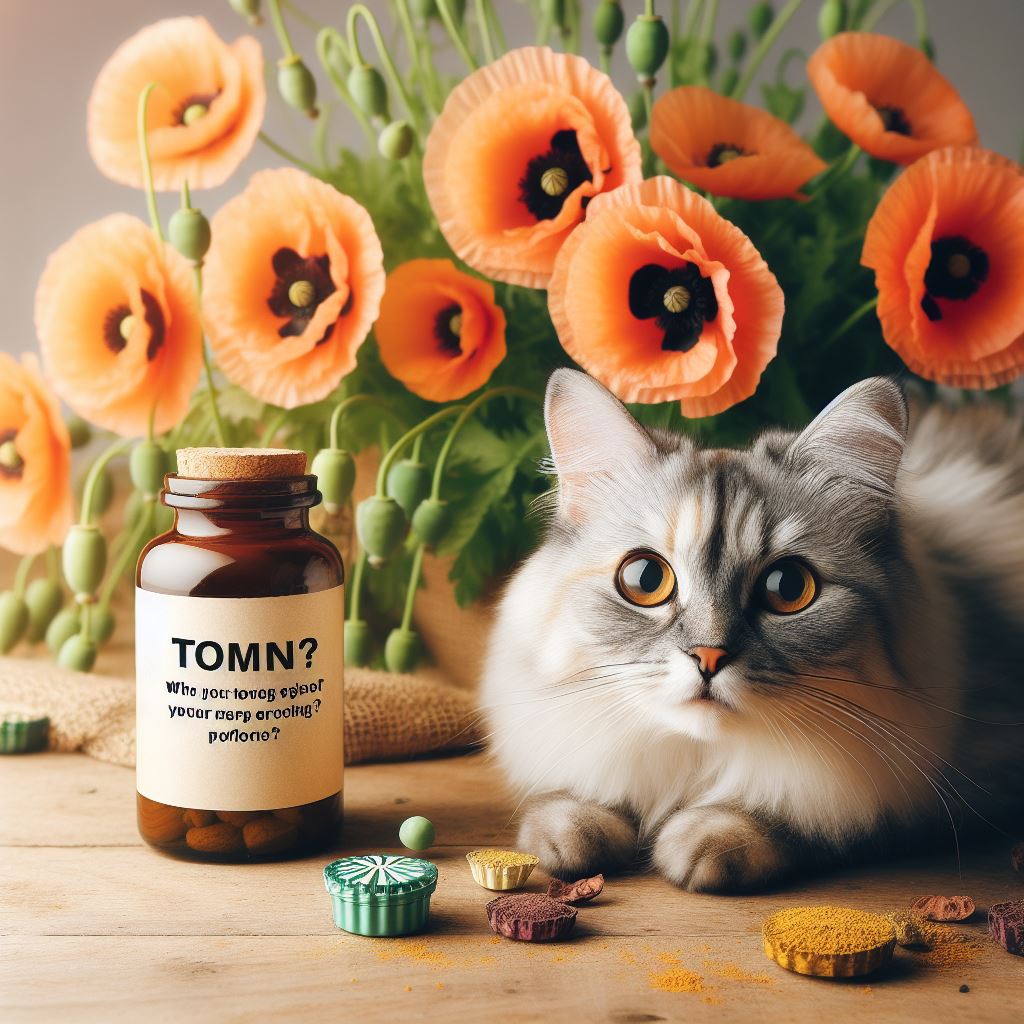
Informing Others: Share information about the toxicity of poppies to cats with friends, family, and other pet owners. Discuss the potential risks and symptoms of poppy ingestion in cats.
Social Media Campaigns: Utilize social media platforms to raise awareness about poppies being toxic to cats. Create posts, infographics, and share relevant articles to reach a wider audience.
Pet-Friendly Community Events: Organize or participate in community events focused on pet safety. Use these opportunities to educate others about the dangers of certain plants, including poppies, to feline friends.
Collaborate with Local Veterinarians: Work with local veterinarians to organize workshops or informational sessions for pet owners. Veterinary professionals can provide valuable insights and guidance on keeping cats safe from toxic substances like poppies.
Create Educational Materials: Develop flyers, brochures, or handouts that highlight the toxicity of poppies to cats. Distribute these materials at pet stores, animal shelters, and veterinary clinics.
Raising awareness about poppies being toxic to cats can help pet owners make informed decisions and take proactive measures to safeguard their beloved feline companions. By working together to educate others, we can create a safer environment for cats and prevent unnecessary exposure to harmful plants like poppies.
Frequently Asked Questions
Are poppies toxic to cats?
Yes, poppies are toxic to cats and can cause symptoms such as vomiting, diarrhea, lethargy, and in severe cases, respiratory depression and death.
How can I protect my cat from poppy poisoning?
To protect your cat, ensure that there are no poppy plants in your home or garden. If you suspect your cat has been exposed to poppies, seek immediate veterinary care.
Can cats have poppy seeds or poppy products?
It’s best to avoid giving your cat any food or products containing poppy seeds or poppy-derived ingredients, as they can be harmful to felines.
What should I do if my cat ingests poppy seeds?
If your cat ingests poppy seeds, contact your veterinarian immediately. In some cases, treatment may be needed to prevent potential toxicity.
What are the signs of poppy poisoning in cats?
Signs of poppy poisoning in cats include vomiting, diarrhea, weakness, dilated pupils, difficulty breathing, and changes in heart rate. Immediate veterinary attention is crucial if you suspect poppy poisoning.
| Question | Answer |
|---|---|
| Are Poppies Toxic to Cats? | Yes, certain types of poppies can be toxic to cats. |
| Toxic Components | Alkaloids in poppies may pose a risk if ingested by cats. |
| Symptoms of Poisoning | Watch for signs like lethargy, vomiting, and dilated pupils. |
| Immediate Actions | Seek immediate veterinary assistance if poisoning is suspected. |
| Preventive Measures | Keep poppies out of reach and opt for cat-friendly plants. |
| Potential Risks | Both indoor and outdoor poppies may pose a threat to cats. |
| Vet Consultation | Consult with a veterinarian for tailored advice and treatment. |
Note: Always consult with a veterinarian for personalized advice regarding pets and potential toxicity concerns.
Keeping Your Cat Safe: Are Monstera Toxic To Cats?
Read More Now..






